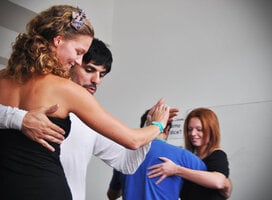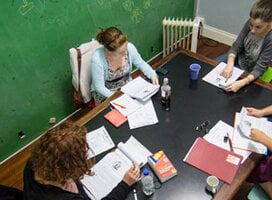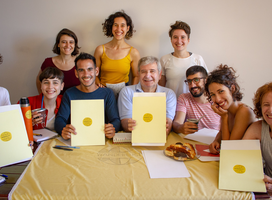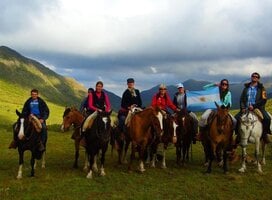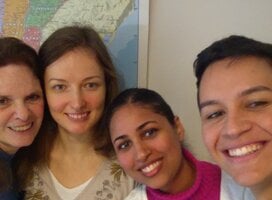Spanish Language Schools in Buenos Aires
Buenos Aires reminds you of somewhere. Paris, perhaps, or Italy? Maybe it’s one of the Argentina’s South American Neighbors. It’s impossible to put your finger on what seems so effortlessly familiar, yet even as the city gives you déjà vu, you’re surprised at every corner by the uniqueness of it all. Achingly recognizable and totally distinct, Buenos Aires will steal your heart.
For a student interested in learning Spanish abroad, Buenos Aires will welcome you with open arms. The city’s vibrant and eclectic energy, its rich history and its concentration of fantastic art, cuisine and community, all make it an unforgettable location to perfect your Spanish.
Read the guide to finding a language school in Bueno Aires on this page written by Go Overseas experts, just for you. Then choose a Spanish language program from the list below. You will be well on your way to becoming a fluent Spanish speaker!
With heavy influence from Italian, indigenous languages, and even French, German and English, castellano rioplatense, or Argentinean Spanish, varies quite a bit from other dialects. For example, the pronouns and verb tenses hark back to 16th century Spain, Thus, while someone in Spain says "Ven tú", in Argentina they'd say "Vení vos". And watch out for the “ll”s and “y”s- you’ll likely hear a variety of pronunciations, but the most common is like the English “j” in "jury" (and occasionally the “sh” in "ship").
Slang also differs significantly—some estimate that as many as 9,000 common words are unique to Argentina! Not to mention that Argentineans use the word “che” so often and in so many contexts, that due to this verbal tick, the famous Argentine revolutionary Ernesto Guevara was dubbed "Che" by his Cuban comrades.
Even language learners who are quite comfortable in other Spanish dialects will benefit from a few lessons in Rioplantense.
Program Types
There are tons of excellent courses to learn Spanish in Buenos Aires. As a major city with universities, language schools, private teachers and taxi drivers- you’ll never be short on ways to practice Spanish. But how will you pick the right method? Consider your language learning goals and your budget, and decide which program is right for you.
If you want to make big progress while learning Spanish in Buenos Aires, you’ll have to dedicate a lot of time to working and speaking. Hiring a private teacher or participating in a face-to-face language exchange are two excellent ways to hone your language skills. Private teachers can focus their attention and give you the full benefit of their years of experience. They’re also great if you need a flexible schedule or want to concentrate on a particular subject. However, private courses can get pricey; if you’re interested in the intensity of a one-on-one meeting but can’t afford a tutor, investigate conversation exchanges in your area. You can find a language partner by looking online, by posting flyers at a local café or university, or attending an event by Spanglish Exchange. Spanglish is a great organization with locations in Portland, Spain and (drumroll, please) Buenos Aires! They organize meet-ups at local bars where language learners (in both English and Spanish) and talk “speed date” style. Locals and foreigners chat in pairs – five minutes in English, five minutes in Spanish, and then switch to another partner.
If you prefer a more general language course or want more social learning experience, consider group courses at a language school or at a university. Group courses come in many variations; you can meet as little as once a week or study every day. Sessions can range from 1 week to 6 weeks or more. If you are planning to stay in Buenos Aires for more than a college semester, consider enrolling in Español para extranjeros at the University of Buenos Aires.
Why Learn Spanish in Buenos Aires
The city of Buenos Aires is a must for any visitor. If you’re considering learning Spanish Abroad, look no further. The coolest of cool, the hippest of hip, you’re in Buenos Aires, baby.
Around Town
Buenos Aires is a HUGE city with no end of neighborhoods to explore and things to see. Depending on the length of your stay, you may only have the opportunity to visit a feel of the incredible corners of the city. Are you interested in history, museums and shopping? Set up in Microcentro or Downtown where you will find amazing architecture and bustling commerce. If you’re more interested in a good meal, head to Las Cañitas. It’s considered one of the safest neighborhoods in Buenos Aires because of a nearby military base, but it’s a fashionable hub for bars and restaurants. Las Cañitas is popular with expats and vacationers- you won’t be off the beaten path, but you will have a good time! If you want to live the high life, explore Recoleta. It is firmly established as the cultural neighborhood of Buenos Aires, with beautiful architecture, high end hotels, fashionable boutiques and restaurants reminiscent of Haussmannian boulevards of Pairs. If you want something more down to earth, you’ll love San Telmo, with cobblestoned streets and a crumbling charm that evokes the beauty of a bygone age.
Affordability
Cost of living in Buenos Aires is cheapcheapcheap compared to any European or US city. The “Paris of South America” won’t hurt your wallet like the Paris in France.
A furnished apartment in a lovely neighborhood will cost anywhere from $400 to $900 USD. You can go out for a beautiful steak dinner for two, with a bottle of great Argentine wine for about $25. And at 30 cents US for a bus ride, public transportation is a dream. You can budget anywhere from $400 and $2000 per month, in order to live somewhere between broke and comfortable.
If you’re a native English speaker (without a strong regional accent) and need a little extra dough, it’s fairly easy to teach English in Argentina-even without TEFL certification. You won’t make a living unless you commit a lot of time and effort to build a reputation and a client base, but it will help cover costs.
Cultural Immersion/Extracurricular Activities
Buenos Aires is rich with art and culture. It can be seen on the streets, in shop windows and even in the air itself, as music drifts through the city. Language students learning Spanish in Buenos Aires will certainly be affected by the magic of the city. One of the benefits of studying a language abroad is being inspired by the city to practice your practical language skills.
The Tango is woven into the fabric of the city. Everyone should take the time to attend a Milonga, a traditional dance event. Don’t be surprised if you get asked to dance and don’t be afraid to say yes! Chatting with your partner can be an excellent way to practice your Spanish.
Highlights
- Check out the crowd: 2,890,200 people live in Buenos Aires proper, with a metro area of nearly 13 million (making it the 2nd largest metropolitan area in South America).
- Did you know...? Argentina has more psychiatrists per capita of anywhere on earth! Buenos Aires even has its own psychoanalytic district – the appropriately named Ville Freud.
- Since when? The first settlement on the banks of the Río de la Plata in 1536, for years it was a target for indigenous tribes, pirates, the British and more. It was also a center for trade and immigration, which shaped the vibrant city we see today.
- Don’t Miss... The Argentinean Tango is world, renowned- head to the neighborhood of La Boca and catch a glimpse of Tango dancers practicing in the streets.
- YUM: Argentina is known for its grills or parrillas, so head over and order a Parrillada Completa, which roughly translates to “Every-kind-of-meat-you-can-imagine-so-eat- until-you-feel-slightly-ill”. When you’ve finished, and you’re groaning pathetically to yourself about portion control, finish off the meal with an alfajor- a cookie filled with dulce de leche and covered in chocolate.
Learning a language abroad can be a financial drain. Teachers, university, and high school students will find a bunch of scholarships and grants to help them get to Buenos Aires. For anyone else, there are still travel grants and fundraising tips that will get you there in no time!
- The Delaying the World travel grant offers up to $3,500 to a lucky few. You must be between the ages of 21-29 years old and must occasionally report on your "fellowship escapades" with photos.
- The Travelocity Travel for Good award provides (lots of) funds for individuals who incorporate a volunteer aspect into their next vacation.

